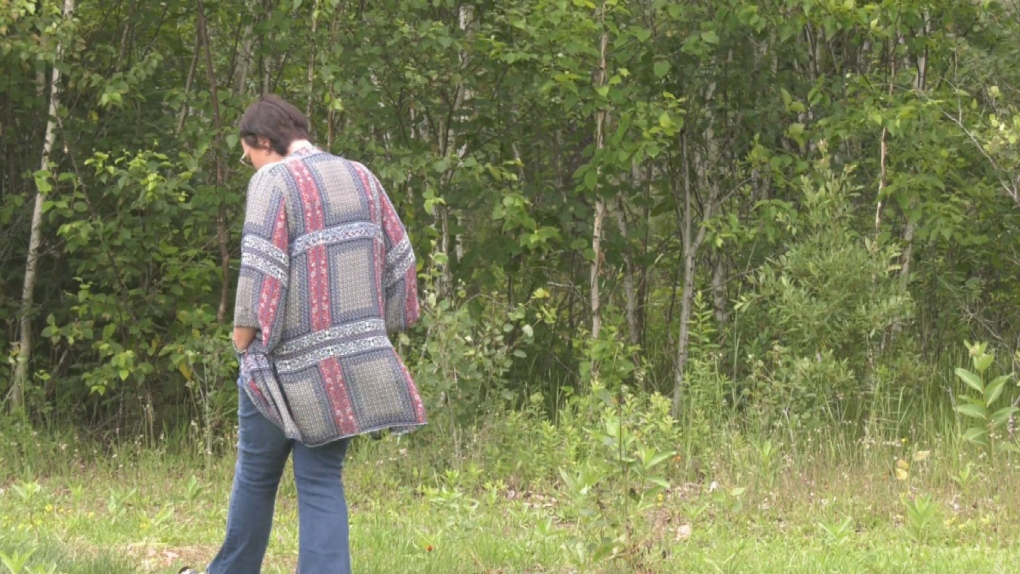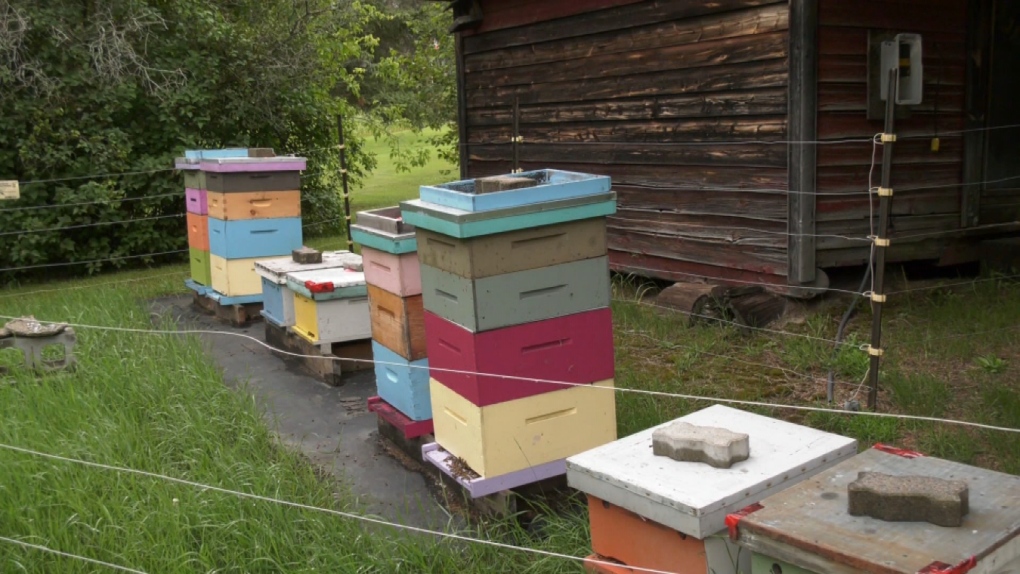Another northern Ont. beekeeper looking for answers after 1.5M bees suddenly die
A northern Ontario beekeeper has lost half of her bee population – more than1.5 million bees to be exact – due to what she believes is an acute chemical kill.
 Northern Ontario beekeeper Dawn Lalonde walking through fields that were once a buzz with bees after losing more than 1 million bees from her colonies in June 2024. (Lyndsay Aelick/CTV News Northern Ontario)
Northern Ontario beekeeper Dawn Lalonde walking through fields that were once a buzz with bees after losing more than 1 million bees from her colonies in June 2024. (Lyndsay Aelick/CTV News Northern Ontario)
Dawn Lalonde wants to send samples away to find out what happened and to prevent the same thing from happening to others.
CTV News caught up with Lalonde as she walked through the empty fields in the Greater Sudbury community of Lively, which used to be the home to just under 20 colonies of bees. She said everything was textbook perfect from the milkweed starting to come up and wildflowers growing – however, all that changed three weeks ago when she arrived to find complete silence.
“There was dead bees. There was bees with their tongues out,” Lalonde said.
“There was bees crawling in the grass, suffering.”
 Northern Ontario beekeeper Dawn Lalonde holding one of more than 1 million bees that suddenly died in June 2024. Lalonde believes the mass deaths were caused by chemical toxicity. (Lyndsay Aelick/CTV News Northern Ontario)
Northern Ontario beekeeper Dawn Lalonde holding one of more than 1 million bees that suddenly died in June 2024. Lalonde believes the mass deaths were caused by chemical toxicity. (Lyndsay Aelick/CTV News Northern Ontario)
She told CTV News that northern beekeepers expect winter losses but this was not the case since the provincial inspector had just checked on her colonies two weeks prior.
Lalonde said she thinks the mass death was caused by some sort of chemical but she is not sure what chemical.
“I'm not 100 per cent sure (what) they’re is spraying in people's lawns for beautification projects,” she said.
“(What) they're spraying down at local-area golf courses and greens.”
Not the first time
Earlier this year, in the spring, Manitoulin beekeeper Janice Mitchell lost 15 colonies of bees due to high levels of a toxic herbicide glyphosate.
“I had high, high levels, higher than what was acceptable for drinking water for humans and I had that evident in my bees,” said Mitchell.
“Unfortunately, there was no standards. There's no reference range.”
She told CTV News that she is shocked no one has set limits on the use of glyphosate.
“I reached out to our association and our universities, academia and provincial apiaries and unfortunately, it's been a little quiet from those ends,” said Mitchell.
Testing for what happened is costly
The Ontario Beekeeper's Association represents approximately half of all beekeepers in the province – about 1,600 or so.
“(Unfortunately,) we don't have the funding available to go out and test everyone's bees,” said the association’s president, Ian Grant.
“We do always ask our partners whether it's the federal or the provincial governments or other stakeholders to help us, research (or) fund research projects.”
A huge loss
Lalonde said she estimates the loss to her business, True North Honey Company, in honey is about $25,000.
 A collection of bee colonies in the Greater Sudbury community of Lively that recently lost more than 1 million bees. (Lyndsay Aelick/CTV News Northern Ontario)
A collection of bee colonies in the Greater Sudbury community of Lively that recently lost more than 1 million bees. (Lyndsay Aelick/CTV News Northern Ontario)
Lalonde has recently set up a GoFundMe to save pollinators in northern Ontario.
Lalonde say the fundraiser will not allow her to recoup her losses but it will cover the cost of testing to determine the cause of the mass bee deaths.
CTVNews.ca Top Stories

opinion Tom Mulcair: Prime Minister Justin Trudeau's train wreck of a final act
In his latest column for CTVNews.ca, former NDP leader and political analyst Tom Mulcair puts a spotlight on the 'spectacular failure' of Prime Minister Justin Trudeau's final act on the political stage.
B.C. mayor gets calls from across Canada about 'crazy' plan to recruit doctors
A British Columbia community's "out-of-the-box" plan to ease its family doctor shortage by hiring physicians as city employees is sparking interest from across Canada, says Colwood Mayor Doug Kobayashi.
'There’s no support': Domestic abuse survivor shares difficulties leaving her relationship
An Edmonton woman who tried to flee an abusive relationship ended up back where she started in part due to a lack of shelter space.
opinion King Charles' Christmas: Who's in and who's out this year?
Christmas 2024 is set to be a Christmas like no other for the Royal Family, says royal commentator Afua Hagan. King Charles III has initiated the most important and significant transformation of royal Christmas celebrations in decades.
Baseball Hall of Famer Rickey Henderson dead at 65, reports say
Rickey Henderson, a Baseball Hall of Famer and Major League Baseball’s all-time stolen bases leader, is dead at 65, according to multiple reports.
Arizona third-grader saves choking friend
An Arizona third-grader is being recognized by his local fire department after saving a friend from choking.
Germans mourn the 5 killed and 200 injured in the apparent attack on a Christmas market
Germans on Saturday mourned the victims of an apparent attack in which authorities say a doctor drove into a busy outdoor Christmas market, killing five people, injuring 200 others and shaking the public’s sense of security at what would otherwise be a time of joy.
Blake Lively accuses 'It Ends With Us' director Justin Baldoni of harassment and smear campaign
Blake Lively has accused her 'It Ends With Us' director and co-star Justin Baldoni of sexual harassment on the set of the movie and a subsequent effort to “destroy' her reputation in a legal complaint.
Oysters distributed in B.C., Alberta, Ontario recalled for norovirus contamination
The Canadian Food Inspection Agency has issued a recall due to possible norovirus contamination of certain oysters distributed in British Columbia, Alberta and Ontario.

































